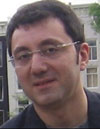Hazem Azmy
 |
|
Abstract: Khaled El-Sawy's Messing with the Mind and the Limits of Theatrical Intervention in Post-Iraq War EgyptIn this presentation, I will attempt to tease out the wider politico-cultural implications of a landmark Egyptian performance, particularly inasmuch as the 2004 theatrical case study seemed to foreshadow some the most salient challenges now besetting today’s (“Post-Revolutionary”) Egypt. Arising in Egypt since the 1990s onwards and consisting of young theatre enthusiasts with varying levels of formal training and artistic merit, the Free Theatre Movement sought to offer up an independent production model "free" of the official control of State-run theatres and their bureaucratic machinery, as well as of the cheapening box-office dictates of commercial theatres. For all such euphoric beginnings, the current millennium still saw the cultural establishment treating the movement's leading figures – many of whom then well past their mid-thirties – as little more than Young Turks yet to come into their own. Indeed, for many of those who once pinned hope on its “free” radical spirit, the movement’s ever-eroding independence thus posed vexing questions about the seeming inevitability of containment – through either sponsorship or censorship, or, ever more often, a debilitating combination of both. In early 2004, however, and as if by sheer force of will, a two-hour or so “agit-prop” piece caused the much-awaited pandemonium. The performance, titled Al-L’eb fil Demagh (Messing with the Mind), was the creation of actor/director/playwright Khaled El-Sawy (b. 1963). Preaching a message of resistance in the aftermath of the US-led invasion of Iraq, the production was unanimously hailed as the ultimate play of the year, both at home and across the whole Arab world. Suddenly, for the first time since the movement’s inception, the long-feminised cultural producers found themselves in a position to start realising their progressive public mandate – or so they thought at the time. |
|
